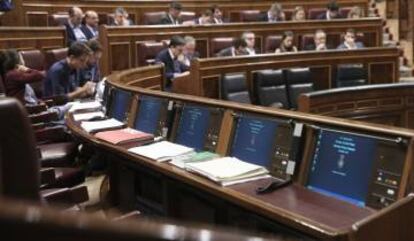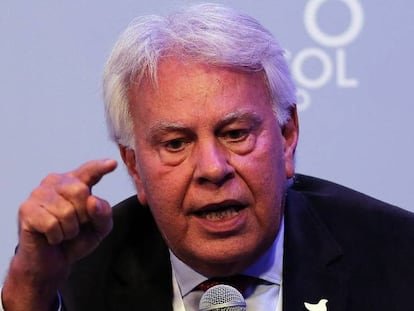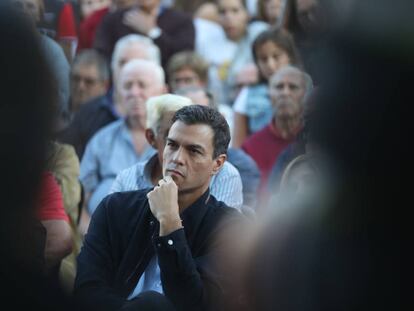Embattled Socialist chief insists party members vote on his leadership
Pedro Sánchez calls federal committee meeting on Saturday he hopes will approve October primaries

There were chaotic scenes at the headquarters of Spain’s Socialist Party (PSOE) on Thursday as its leader, Pedro Sánchez, met with the half of the executive board that has remained loyal to him following the resignation on Wednesday of 17 other members in a bid to force him to resign.
At around 3pm local time, it was announced that Sánchez had called a meeting of the 290-member federal committee for 9am on Saturday. That meeting is expected to convene an extraordinary, two-day party conference for November 12 to elect a leader and leadership. Before that, on October 23, party members will vote in primaries to select candidates.
It was Sánchez’s surprise plans for the party congress that prompted the party rebels to make their move
But critics within the party do not want those events to take place. The resignation of over half of the executive board was aimed at removing Sánchez from his position.
Sánchez has been under mounting pressure in recent weeks from many in his own party after his failure to abstain at an investiture vote in Congress that would have allowed acting Prime Minister Mariano Rajoy of the Popular Party (PP) to form a minority government.
Sánchez arrived at the Socialist Party’s headquarters in Madrid early on Thursday to meet with the members of the executive who support him, with a view to bringing together the party’s federal committee on Saturday. Sánchez announced earlier this week his plan to call an “express” party congress and primaries where grassroots members would vote on his leadership.

The party has effectively split in two, with those calling for Sánchez to go accusing him of trying to hold on to power at any cost. Sánchez and his supporters, who insist the party’s grassroots back him, say that his leadership should be decided at a party conference, with challengers coming forward through a primaries election process.
Shortly after Sánchez arrived at party headquarters, Verónica Pérez, the chair of the federal committee, showed up to call a meeting of the Socialists’ Ethics and Guarantees commission in a bid to “shed light” on what she called “a mistaken interpretation” of the party’s statutes by Sánchez.
But Pérez was unable to talk with Sánchez or the remaining members of the executive board, who were in a meeting.
“At this moment, the only authority that exists within the PSOE is the chair of the federal committee, and that is me, whether they like it or not,” she told journalists outside the party’s offices, accusing Sánchez and his supporters of “digging in” and saying that he was no longer the party’s leader.
Meanwhile, Ximo Puig, the head of the Valencia regional government, and one of 17 executive board members who resigned on Wednesday, accused Sánchez and his supporters of refusing to talk, blaming him for the resignations.
Nevertheless, speaking to reporters on Thursday, Puig played down the rupture within the Socialist Party. “There has been hostility, there is an open debate in the PSOE because there are efforts to hold a conference immediately, but that isn’t going to solve the root problems of Spanish social democracy,” he said, adding: “The 17 who have resigned are not a gang, there’s no group and this isn’t about groups, it’s about political positions,” he added.
Puig said that “a lot” of dialogue was needed, given that within those who have resigned, there was no single position. “We may well end up having a third election.”
Spain has been in political limbo since the general election in December 2015, when the Popular Party took the most votes but fell short of a majority. No party was able to cut a deal to form a government, leading to a new poll in June. The result was more or less the same, with the PP garnering the most votes, but again falling short of a clear win.
The Socialists’ refusal to abstain in the second round of an investiture vote has prolonged the impasse, which is currently heading toward a third general election, potentially on Christmas Day.
English version by Nick Lyne.
17 resignations + 3 vacancies
Party regulations state that if over half of the members of a regional executive board resign, the latter can be suspended and an interim team appointed.
This is what rebels are attempting to do at the national level, through 17 resignations that, added to three existing vacancies, bring the total of empty seats on the board to 20.
However, PSOE regulations say nothing about such a move at the national level, leaving the door open to speculation as to what will happen next – and who has the power to make it happen.









































